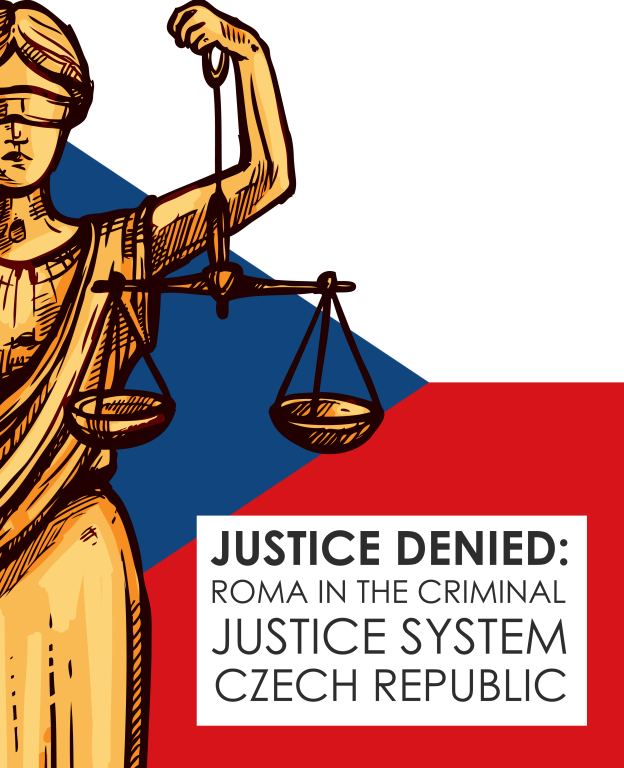Breaking the silence: justice denied for Roma in the Czech Republic
07 February 2023

This report, Justice Denied, produced by the ERRC in partnership with Fair Trials, is the first in a series that aims to break the silence over the mistreatment of Roma, and to challenge governments’ continued denial of the racism that underpins disparities in criminal justice systems across Europe.
In a video interview with ERRC, Jozef Miker explained how his son, who had never previously been in trouble with the police was badly beaten during his arrest and 20 hours detention over a minor incident. Worse still, when the young man’s mother pleaded with the officers not to break her boy’s arms, she herself was attacked. As Miker recalled,
“Imagine that, a young policeman knocked down an elderly woman, smacked her against the floor, kneeled on her and handcuffed her … when she was sitting on a bench, another policeman came, picked her up and threw her down on the ground out of the blue.”
His wife spent two weeks in hospital recovering from her injuries. Such incidents are far from uncommon, but the problem runs far deeper than police violence. As to how deep racism runs, perhaps the most telling incident was the reaction of Czech Prime Minister Andrej Babiš after the police killing of Stanislav Tomáš in June 2021.
Commenting after shocking video footage went viral, showing one police officer kneeling on the Romani victim’s neck for several minutes, Babiš thanked the police officers for their work and commented, “This is sad, but a normal, respectable person would have a hard time getting into such a situation.” This disparagement of the victim, the subsequent official obfuscation and political inaction, compounded by wider public indifference, illustrated how the denial of racism compounded the tragedy and caused many Romani activists to loudly wonder if ‘Roma lives matter’ at all.
As this report Justice Denied reveals, institutional racism is embedded in the criminal justice system in the Czech Republic and all too often it is Roma who pay the price. In this report, the first in a series covering four countries, the evidence indicates that Romani defendants face discrimination from police, judges, prosecutors, and often their own lawyers. In the Czech Republic, similar to many other European countries, pervasive and routine antigypsyism in state and society leads to racially-biased decisions and outcomes for Roma in the criminal justice system.
This research report offers further evidence that Roma in the Czech Republic are more likely to be ethnically profiled and drawn into the criminal justice system than non-Roma. Once drawn in, Roma are less likely to receive adequate legal representation, and more likely to be held in pre-trial detention and to receive custodial sentences than their non-Roma counterparts. These latest findings provide stark and sobering confirmation that despite all the protestations by prosecutors and denials by judges, racial bias skews outcomes for Roma in the Czech criminal justice system.
The depth of this bias was made clear by some lawyers taking part in the research, who openly expressed stereotypically racist notions that Roma – who they perceive as generally impulsive, irresponsible, and unintegrated and uncooperative – have a ‘different perception of truth’ and a tendency to lie; and that they possess culturally-conditioned perceptions of ownership and obligation that are at odds with the majority society, and are thus likely to re-offend. Such attitudes reflect the pervasiveness of antigypsyism in a society where Roma have long been labelled as ‘inadaptables’. The research findings shine a light on how racist bias is engrained and routinised in the criminal justice system, a system where there is precious little justice to be had for Roma.
Despite decades of recommendations on how to eradicate racial bias in justice and policing, the prospects of meaningful criminal justice reform remain as remote as ever in the Czech Republic and other EU member states with substantial Romani populations. Official denial from national authorities and constant deflection by EU institutions has stymied any serious attempts to root out systemic racism against Roma within the criminal justice systems of Europe.
Among the many recommendations to the Czech authorities contained in the report, there are two worth repeating as essential first steps. First, complaints concerning allegations of discriminatory behaviour by criminal justice professionals and police officers should be handled by an adequately resourced and independent body which is easily accessible to all complainants. Second, sanctions against offenders must match the severity of their actions and serve as an effective deterrent; and victims who register complaints must be protected from intimidation and reprisal actions by police officers.




